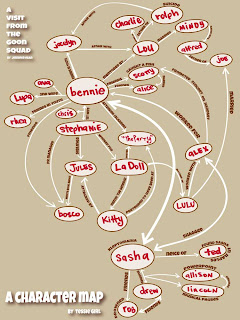Battle Lines
Kiana Davenport writes on her blog about an incredible and discouraging ordeal she recently went through:
When she signed the contract, it wasn't for her backlog - if the publisher thought so, that's a huge issue. Kiana and any author has the freedom to do what she wants to with work she holds the rights to. It can't be they object to her publishing anywhere else at all; one must assume that they understood and most likely encouraged the fact that Kiana would be continuing to write and submit short stories to magazines while under contract with them, and that these stories would possibly be published. This actually would be a necessary and expected means of promotion by an author they had invested in. So... what cost is her self-publishing works she now holds the rights to?
Not money. The couple hundred dollars she might make from a sale of a short story is nothing. The money she makes from Cannibal Nights may or may not be nothing. It doesn't represent lost revenue for the publisher. What's really at stake for the publisher is two fold:
UPDATE: Now, there seems to be debate on whether a non-compete clause existed in her contract. If it did, and Kiana signed it, then she is in violation of it. My opinions center particuarly not on the purpose of the clause - but the intent. If the intent is to prevent an author from self-publishing or publishing any work to which they hold the rights - i.e. previously published material that is not a new novel the publisher has paid you for - then I disagree with that. Good discussion here.
In January, 2010, I signed a contract with one of the Big 6 publishers in New York for my next novel. The book was scheduled for hardback publication in August, 2012, and paperback publication a year later. Recently that publisher discovered I had self-published two of my story collections as electronic books. To coin the Fanboys, they went ballistic. The editor shouted at me repeatedly on the phone. I was accused of breaching my contract (which I did not) but worse, of 'blatantly betraying them with Amazon,' their biggest and most intimidating competitor. I was not trustworthy. I was sleeping with the enemy.It gets worse:
Last week, I received from their lawyers an official letter terminating my contract with them, "...for permitting Amazon to publish CANNIBAL NIGHTS, etc...." and demanding back the $20,000 they had paid me as part of their advance. Until then, this publishing giant is holding my novel as hostage, a work that took me five years to write. My agent assures me I am now an 'anathema' to them.What's really at stake here for the publisher?
When she signed the contract, it wasn't for her backlog - if the publisher thought so, that's a huge issue. Kiana and any author has the freedom to do what she wants to with work she holds the rights to. It can't be they object to her publishing anywhere else at all; one must assume that they understood and most likely encouraged the fact that Kiana would be continuing to write and submit short stories to magazines while under contract with them, and that these stories would possibly be published. This actually would be a necessary and expected means of promotion by an author they had invested in. So... what cost is her self-publishing works she now holds the rights to?
Not money. The couple hundred dollars she might make from a sale of a short story is nothing. The money she makes from Cannibal Nights may or may not be nothing. It doesn't represent lost revenue for the publisher. What's really at stake for the publisher is two fold:
- They have signed an author who is actively still self-publishing. Self-published writers are not the legitimized, industry sanctioned writers we publish. No thanks.
- As an author that belongs to a house, your voice belongs to them. You have no voice but which they choose to express.
UPDATE: Now, there seems to be debate on whether a non-compete clause existed in her contract. If it did, and Kiana signed it, then she is in violation of it. My opinions center particuarly not on the purpose of the clause - but the intent. If the intent is to prevent an author from self-publishing or publishing any work to which they hold the rights - i.e. previously published material that is not a new novel the publisher has paid you for - then I disagree with that. Good discussion here.

Comments